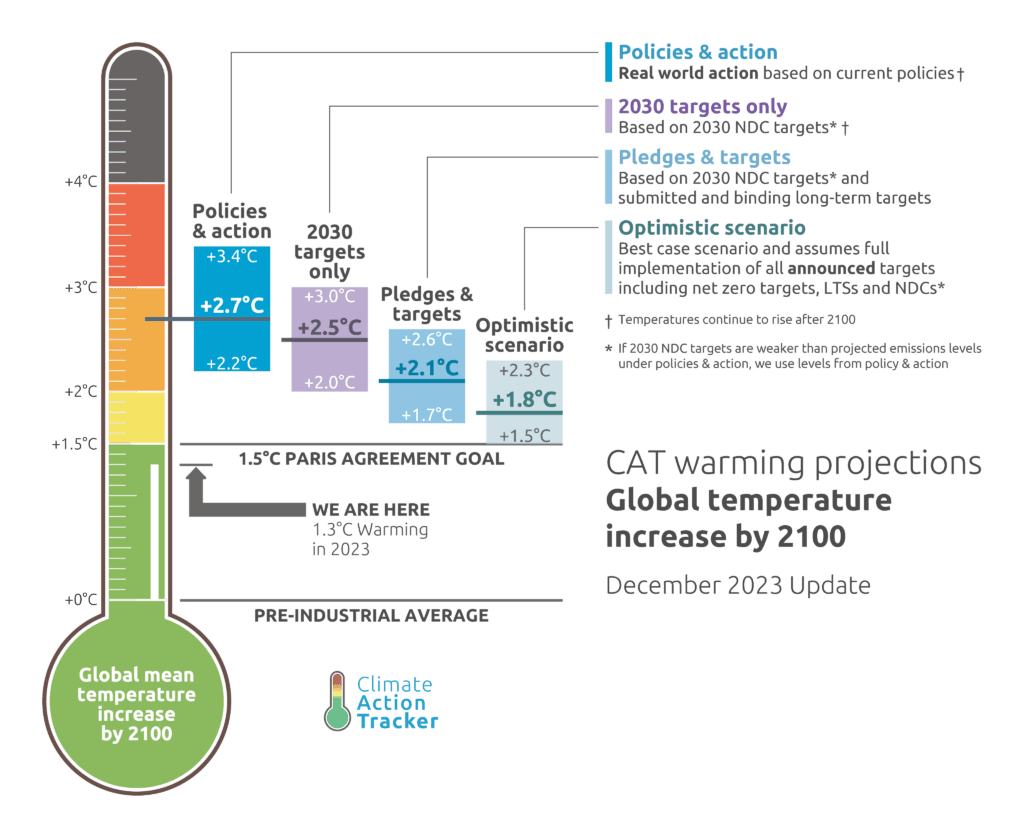Climate Crisis Stagnation: Fossil Fuels Endgame Brings Focus onto False Solutions

Despite government promises and high-profile international climate conferences, the trajectory of global warming remains largely unchanged, as evidenced by the lack of improvement in warming projections since the Glasgow conference two years ago. This stagnation is particularly alarming given the escalating impacts of climate change, with every continent experiencing record-breaking heat, wildfires, tropical cyclones, or other extreme events. In this context, it becomes crucial to assess the effectiveness of current climate actions and whether they align with the urgent need for meaningful and impactful solutions.
The fossil fuel industry and some governments are still trying to support every unrealistic techno fix to see if one of these false solutions sticks.
The Climate Action Tracker

Stagnant Progress Amid Worsening Climate Impacts
In the past year, the world has witnessed unprecedented climate events on every continent, reinforcing the immediate threat posed by climate change. Despite these alarming developments, there has been no discernable shift in the level of global climate action. Governments and policymakers have yet to implement transformative measures that would significantly alter the trajectory of global warming.
Government 2030 Targets and Projected Warming
One of the key indicators of climate action effectiveness is the analysis of government-set targets, particularly those for the year 2030. Unfortunately, the latest data reveals that these targets are insufficient, and if achieved, would still lead to a 2.5°C increase in global temperatures by the end of the century. This projection is 0.1°C higher than the previous year’s estimate, signaling a concerning lack of progress.
Weak Existing Targets and Inadequate NDC Updates
The marginal increase in projected warming can be attributed to the weakness of existing targets rather than any substantial improvements or shifts in the updated Nationally Determined Contributions (NDCs). Many countries continue to rely on inadequate policies, failing to set ambitious emission reduction goals that align with the scientifically recommended targets. The lack of substantial updates to NDCs further underscores the inadequacy of global efforts in curbing climate change.
False Solutions and the Fossil Fuel Endgame
While governments pledge commitment to climate action, the persistence of false solutions and the influence of the fossil fuel industry remain major impediments to genuine progress. The failure to transition away from fossil fuels continues to exacerbate the climate crisis. Investments in renewable energy and sustainable practices are insufficient, and the global reliance on fossil fuels remains a significant driver of greenhouse gas emissions.
The Bottom Line
As the world grapples with the intensifying impacts of climate change, the lack of substantive progress in global warming projections underscores the urgent need for transformative action. Governments must reassess and strengthen their climate targets, prioritize genuine emission reductions, and actively work to phase out fossil fuels. The current trajectory, marked by false solutions and insufficient targets, threatens the well-being of future generations and the sustainability of the planet. Swift and meaningful action is imperative to avert catastrophic consequences and secure a sustainable future for all.





